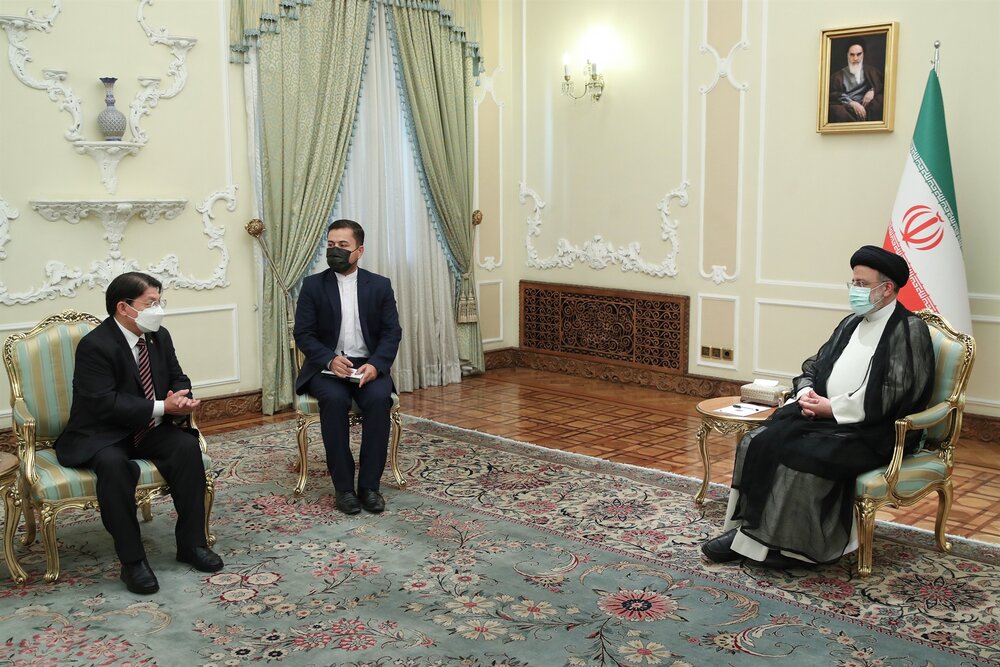Close co-op with friendly nations can fend off U.S. pressure: Raisi

TEHRAN- Ebrahim Raisi, the President of Iran, asserted on Sunday that encouraging collaboration among friendly countries can prevent the U.S.-led pressure against sovereign states.
Raisi made the comments in a meeting with Nicaraguan Foreign Minister Denis Moncada Colindres in Tehran.
He criticized the U.S. and the West for using subjects like human rights as leverage against independent and robust nations, noting that such "new schemes" had previously failed as a result of Washington's missteps.
The resistance to U.S. hostility and pressures, he added, was one of the causes that led to close collaboration between Iran and Nicaragua.
He also praised the strong and constructive cooperation between the two countries in international organizations.
Raisi pointed out that the abundant potential provides a good foundation for the growth of relations between Latin American nations and Iran.
The Nicaraguan foreign minister, for his part, praised Iran for defying U.S. pressure and sanctions and emphasized the need to expand Managua's commercial relations and economic collaboration with Tehran.
The comprehensive agreement for economic and commercial cooperation between Iran and Nicaragua, which was signed earlier in the day by the two countries' foreign ministers, was encouraged to be put into action.
The agreement was signed by the Nicaraguan foreign minister and his Iranian counterpart Hossein Amir Abdollahian.
Historically, the Islamic Republic has placed a high priority on improving its relations with countries in Latin America, including Nicaragua. Both of the two nations have a history of defying U.S. economic pressure and sanctions.
U.S. sanctions any country opposing it: speaker
Mohammad Bagher Qalibaf, the speaker of the Iranian parliament, also late on Sunday criticized the U.S. use of sanctions against other countries, saying that sanctions have become a leverage Washington uses against any countries opposing it.
“Americans pursue their own interests and use sanctions against any country that opposes them, and they always try to interfere in the internal affairs of revolutionary countries,” Qalibaf said in a meeting with the Nicaraguan foreign minister, according to IRNA.
In the meeting, Qalibaf underlined the need for communication between Iran and Nicaragua, saying, “This issue is more special for Iran and Nicaragua because we are both anti-imperialism and anti-American. Currently, both countries are under the cruel sanctions of the United States, and this issue is a common ground for cooperation that will secure the national interests of both countries.”
According to Qalibaf, Iran-Nicaragua relationship is beyond a political, commercial and economic relationship and it is an ideological relationship that is meant to deal with oppression.
“The relationship between Iran and Nicaragua is stable and strong. And economic, energy and agricultural cooperation, which are good capacities of the two countries, should be developed under the sanctions,” he added.
Moncada, for his part, underlined the need for strengthening Iran-Nicaragua relations. “My presence in Iran means the continuation of efforts to strengthen the relations between the two countries and the continuation of mutual support that has existed so far in international forums against common enemies,” he said.
Moncada added, “Again, I intend to express my country's position in solidarity with the government and nation of Iran; this solidarity and mutual cooperation existed since the distant past in the 1960s and 1970s, which ultimately led to the victory of the Iranian and Nicaraguan revolutions.”
Moncada emphasized, “The joint economic commission of the two countries is very important and we are preparing the conditions for the formation of this commission because it will bring a leap in relations.”
He said, “We have a broad and varied conceptual and legal cooperation framework between the two countries, and 14 joint agreements were signed last year. We are looking for these agreements to be implemented, and one area of cooperation between the two countries was the donation of Iran's vaccine to Nicaragua.”
Moncada pointed out, “The fight against imperialism is the historical, intellectual, political and fraternal framework that forms and maintains the basis of our relations. And in this way, we seek the best for our nations and defense against invaders. Of course, we know that this process is long, but we must resist to achieve victory.”
